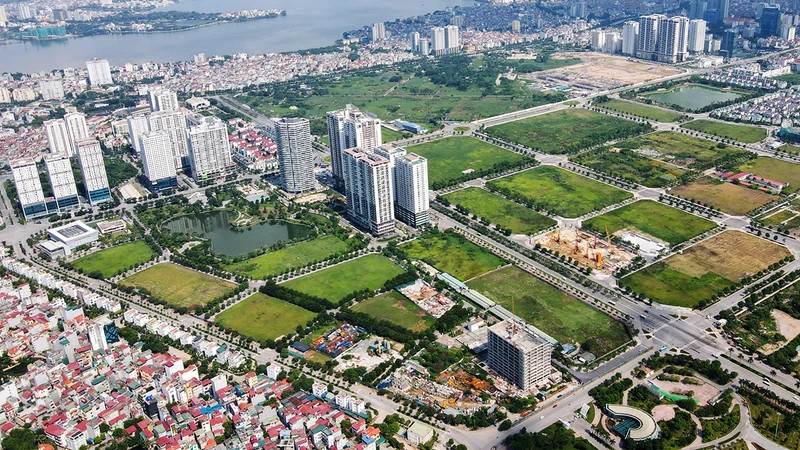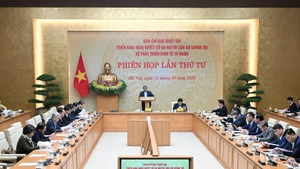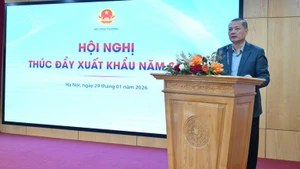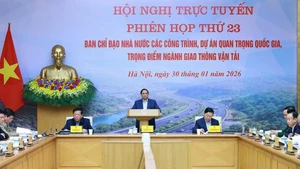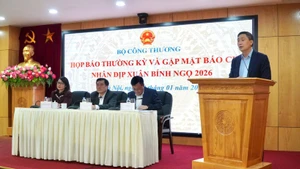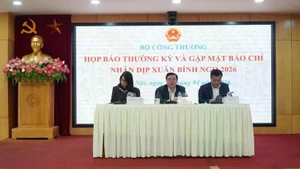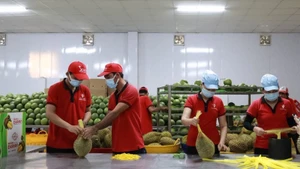The 2024 Land Law, effective from August 1, 2024, has many new amendments and supplements, including regulations on the management and use of public land by public service units and state-owned enterprises.
Waste and violations in land use
The policies and laws of the Party and State on land have clearly affirmed that land belongs to the entire people, with the State representing the owner and managing it in a unified manner. In recent years, to serve the country’s socio-economic development, many areas of land have been assigned to public service units and state-owned enterprises to implement programs and projects. However, many localities, after reclaiming land and assigning it to units and enterprises for use or lease, have not implemented it, causing waste or violations in land use.
Dr. Tran Cong Phan, member of the 15th National Assembly, Permanent Vice President and General Secretary of the Vietnam Lawyers Association, commented that the enforcement of discipline and order in the management and use of public land and the efficiency of exploitation are not high, there are still many shortcomings, greatly affecting the practice of thrift and anti-waste in the recent period.
Monitoring results No. 330/BC-ÐGS dated October 11, 2022 of the National Assembly’s Thematic Monitoring Delegation of the 15th tenure stated that the Government Inspectorate reported that in the 2016-2021 period, the whole country discovered violations of 63,200 hectares of land, and recommended the recovery of 31,287 hectares of land.
The reason for the above situation is, first of all, that the units have not paid attention to and focused on properly implementing the provisions of the Land Law, the Investment Law and many legal documents related to the work of preventing and combating waste and using public land. In particular, the management and use of land during and after the equitization of state-owned enterprises still has many shortcomings.
Specifically, before equitisation, in many cases, a land use plan was not developed or a plan was developed and approved that was not consistent with the plan for arranging and handling houses, land and land use planning; Not transparently disclosing information related to land. After equitisation, land is still used for the wrong purpose, left fallow, disputed, encroached; slow completion of legal procedures; land allocation, land lease, land use conversion without auction; land use conversion not in accordance with planning.
Experts and managers in the land sector said the situation of illegal transfer of public land continues to occur, although the law has many strict regulations related to the management and use of public assets, especially regulations on the management, exploitation and use of public land. Notably, in recent years, through inspection and examination, the authorities have discovered many public lands that have been illegally transferred, turning public land into private land.
A typical example is the case of violations of land management regulations occurring at the Saigon Beer-Alcohol-Beverage Corporation (Sabeco). Meanwhile, the situation of abandoned or improperly used public offices and land, causing waste, is quite common in many localities, especially in large cities with a lot of public land and state agencies and units located in the area such as: Hanoi, Ho Chi Minh City, Hai Phong, Da Nang, Can Tho...
Worryingly, some organisations and individuals have taken advantage of this situation to illegally encroach on public land for various purposes such as parking lots, material storage areas, and food service businesses; many agency offices are not fully utilised, and are being rented out to businesses, restaurants, or other services.
In addition, site clearance in many places is still facing difficulties and shortcomings, the handling of projects that are behind schedule, lack of determination, and violations in land allocation are still common; the awareness of law compliance of land users is still not serious, especially some sanctions for violations are not strong enough to deter.
Ensuring consistency in management
According to Deputy Director of the Department of Land under the Ministry of Natural Resources and Environment Le Van Binh, in addition to the achieved results, the regulations in the 2013 Land Law have gradually revealed many limitations such as: Land use planning has not ensured consistency, comprehensiveness, system, low quality, lack of long-term vision; land resources have not been fully and sustainably exploited, promoted...
In light of the above reality, the 2024 Land Law, consisting of 16 chapters and 260 articles, has been issued to perfect the system of policies and laws on land to be consistent, unified, and consistent with the institution of developing a socialist-oriented market economy.
In particular, the 2024 Land Law has clarified the responsibilities of state agencies in exercising the right to represent land ownership; decentralising authority associated with control and supervision of implementation, ensuring unified management from the central to local levels; adding the principle of publicity and transparency in land valuation...
The above contents are considered important premises to improve the effectiveness of combating waste and violations in the use of public land; at the same time, helping competent authorities have a full legal basis to implement policies and laws on land management in general, and management in the use of public land in particular in our country in the coming time.
Associate Professor, Dr. Le Hong Hanh from the Vietnam Lawyers Association shared that the 2024 Land Law with many new amendments and supplements, including amendments and supplements to regulations on management and use of public land by public service units and state-owned enterprises in particular, will certainly contribute to improving the effectiveness and efficiency of land management and use, combating waste and violations in the use of public land in this area.
However, the 2024 Land Law is related to public assets, along with the 2017 Law on Management and Use of Public Assets. In the 2017 Law on Management and Use of Public Assets, public assets are defined to include many assets, including land. Therefore, state management agencies need to clarify the content of public land and public assets between the 2024 Land Law and the 2017 Law on Management and Use of Public Assets, which still have some problems that need to be identified and overcome.
Dr. Nguyen Van Quyen, Chairman of the Vietnam Lawyers Association, hopes that the National Assembly will continue to strengthen supervision of contents related to the implementation of policies and laws on management and handling of suspended projects, violations of regulations on land law, investment, especially public land areas; The Government and the Prime Minister direct ministries, branches and localities to promptly complete the review, statistics and synthesis of complete information, data and lists of projects violating land laws, thereby having solutions to handle and overcome losses and waste in land management and use.
In particular, it is necessary to fully summarize violations related to land management and use, land handling and recovery to promptly put land into use, promote efficiency, avoid loss and waste, and contribute to economic development.
On the other hand, the Ministry of Natural Resources and Environment, ministries, branches and localities continue to improve mechanisms, policies and regulations related to land management and use, including proposing to raise administrative penalties to a higher level to limit violations in land management and use; strengthen land management, exploitation and use; enhance the role, responsibility and awareness of compliance with land laws of a number of cadres and civil servants; promptly overcome shortcomings and limitations in land management, exploitation and use, ensuring economical, effective and sustainable exploitation, reducing loss and waste of natural resources and state resources.
At the same time, it is necessary to strictly handle the responsibilities of organizations and individuals who allow violations and wrongdoings related to land; slow implementation of inspection recommendations, failure to promptly recover State capital and assets.
